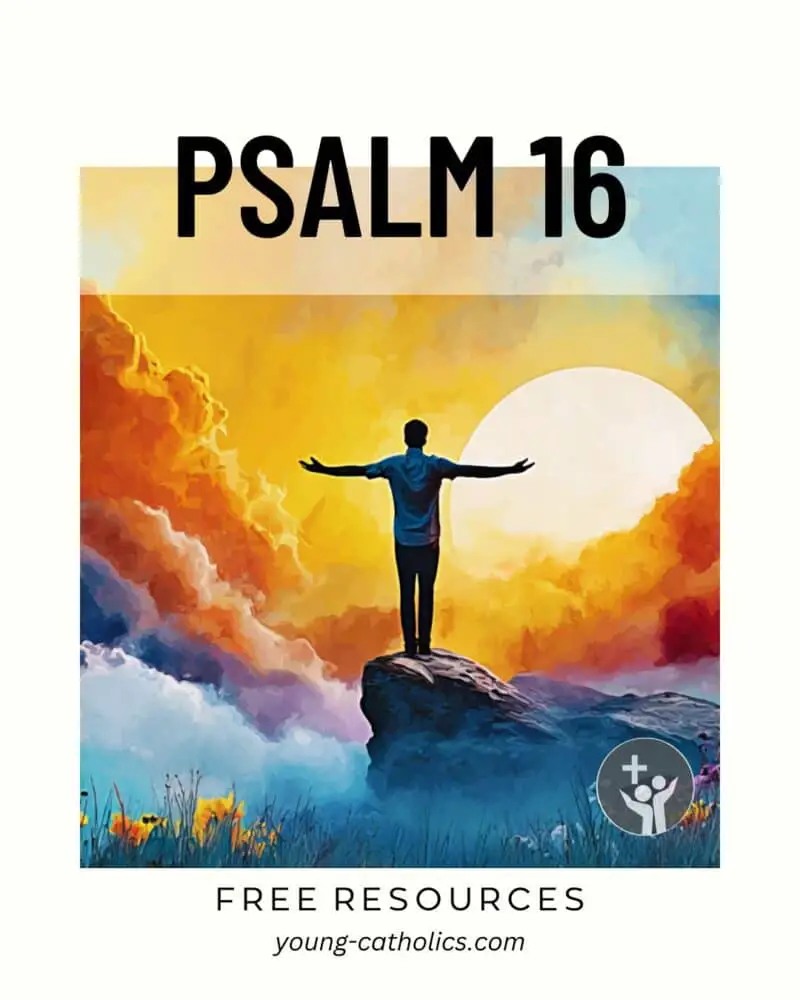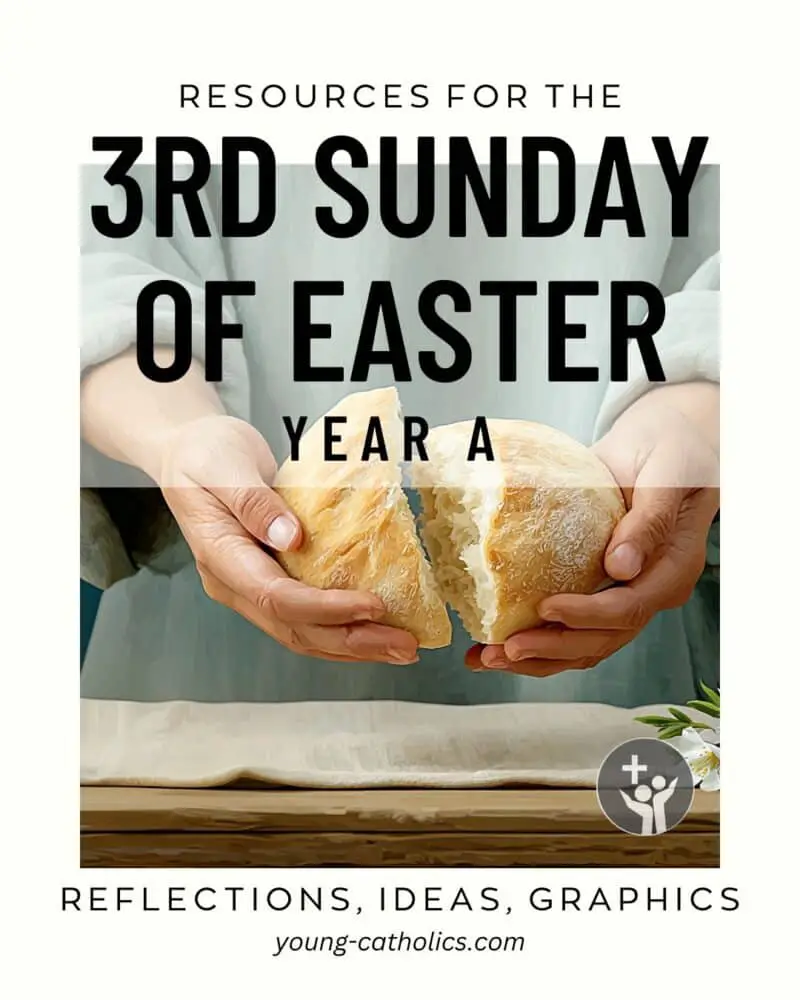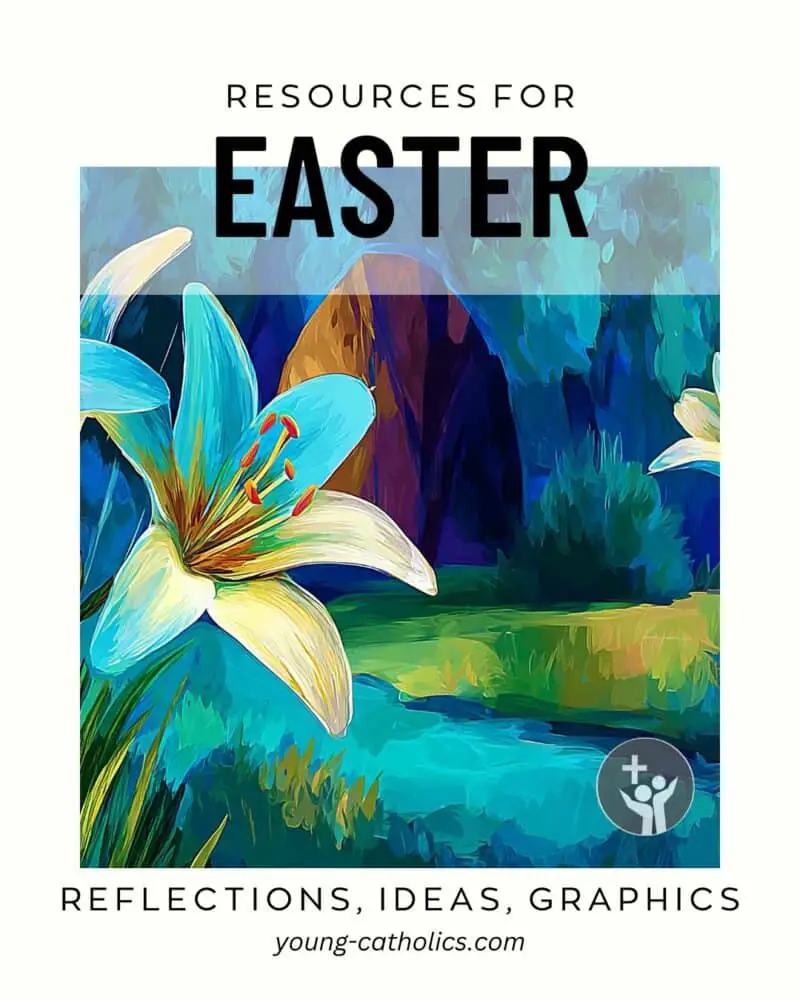Psalm 16

Psalm 16 is a prayer of trust and confidence in God. The writer of the psalm speaks directly to God, asking for protection and declaring that everything good in life comes from the Lord. He is not afraid, even when life is uncertain. His heart is at peace because he stays close to God.
This psalm is often called a “mikhtam,” which could mean a special kind of prayer or song. We don’t know exactly what the word means, but it tells us this psalm was used for worship. Psalm 16 helps us turn our focus away from fear and toward hope. It teaches us to rely on God, not on things that fade or fail.
The psalmist says that God alone is his portion and cup. This image reminds us of the gifts we receive in the Eucharist. Just like the psalmist, we are invited to place all our hope in God. He gives us more than the world can offer. He leads us along a path that brings joy, peace, and life.
Psalm 16 is often used in the Easter season. Saint Peter quotes it in the Acts of the Apostles when he preaches about Jesus. Peter shows that the psalm points ahead to the resurrection. It reminds us that Jesus is the Holy One who did not see corruption. Through him, we are given new life and a share in God’s promise.
A Song of Trust from Long Ago
This psalm comes from the first part of the Book of Psalms. That section includes Psalms 1 through 41. Many of these are connected to King David. Psalm 16 is one of them. The title says, “A miktam of David.” So this psalm is traditionally linked to him.
David was a shepherd, a soldier, and a king. But he was also a man of prayer. He spoke to God often, sometimes in joy and sometimes in fear. This psalm shows his deep trust in God. Even when life was hard, David believed God would protect him.
We do not know the exact time in David’s life when he wrote this. But the words suggest that he may have been facing danger. Instead of running to idols or trying to control things himself, he chose to stay close to God. He knew God was faithful.
The word “miktam” appears in the titles of a few psalms. Its meaning is not fully clear today. Some think it might mean a quiet prayer or a poem for special times. But even if we don’t know the word’s meaning, we can feel the message. It is a prayer of peace and safety in God.
Safe in God’s Hands
One of the main themes in this psalm is trust. The writer gives his whole life to God. He is not afraid, because he knows God will guide him. Catholics are called to live with this same trust. We believe that God is always with us, even when we feel alone.
Another theme is the joy of choosing God over idols. The psalm says that those who chase after other gods will suffer. This reminds us to stay close to the truth. We are made to know, love, and serve God. When we do that, we find peace and lasting joy.
The psalm also speaks about life after death. It says that God will not leave his servant in the grave. As Catholics, we hear this and think of Jesus. He died, but he rose again. Saint Peter used this psalm to explain the resurrection in the book of Acts. This gives us hope that we, too, will rise with Christ.
Finally, the psalm speaks about God’s presence. The writer says that God is at his right hand. He feels safe because he is not alone. In the same way, Catholics believe that Jesus walks with us. In the Eucharist and in prayer, he is near. We do not need to fear. God holds us close.
A Prayer for Right Now
This psalm is still helpful today. Life can feel uncertain. We worry about the future, about our families, or about the world. But this prayer reminds us to place our trust in God. He is strong. He is near. We do not have to figure everything out on our own.
Many people look for happiness in money, power, or fame. But these things fade. The psalm tells us to choose God instead. He is our portion and our cup. That means he gives us what we truly need. When we stay close to him, our hearts find rest.
This prayer also helps us when we are afraid. It reminds us that God walks with us. He protects us and shows us the path of life. Even in times of loss or grief, we can hold on to this hope.
And most of all, this psalm points to Jesus. He is the Holy One who was not left in the grave. Because he rose again, we have hope. We can trust that death is not the end. In every season of life, this psalm helps us stay close to the Lord.
A Prayer Based the Psalm 16
A Prayer for Trust and Hope
Lord, You are my safe place.
When I feel lost or afraid,
Remind me that You are always with me.
Help me to trust You in every moment.
Keep me from following false paths.
In a world full of distractions,
Give me the strength to stay close to You.
You are my only source of peace and joy.
I know You have good plans for me.
Show me the right choices to make.
Guide me when life feels confusing,
And help me to see Your purpose for me.
Be my joy, Lord, even in hard times.
When I feel empty or tired,
Fill my heart with Your presence.
Let me find comfort in knowing You are near.
Thank You for the hope of eternal life.
I know You will not leave me, even after death.
Help me to live each day for You,
With trust that You are leading me home.
Sung in Church Today
Psalm 16 is used in the Catholic Mass on several different days. It often comes up during the Easter season. That is because it points to Jesus rising from the dead. The words, “you will not abandon my soul to the netherworld,” remind us of the resurrection. Peter even quoted this psalm when he preached after Pentecost.
The psalm also appears at Sunday Mass and weekday Mass during Ordinary Time. When we hear it in church, it is usually sung between the first and second readings. The response is often something like, “You are my inheritance, O Lord.” That line helps us focus on what really matters in life.
Psalm 16 is also read at funerals. It brings comfort because it speaks about life beyond the grave. Families who are grieving often find peace in these words. The psalm reminds us that God stays with us, even in death.
When this psalm is prayed in the liturgy, we are joining with all God’s people. People have prayed these same words for thousands of years. When we speak or sing them today, we remember that God is faithful. He will never leave us.

3rd Sunday of Easter Year A
God Is Always Near
Psalm 16:1-2, 5, 7-8, 9-10, 11 is a prayer of trust and joy. The person speaking feels safe with God and knows that the Lord is always near. Even in hard times, he knows that God is his protector. He does not feel lost or afraid. God is with him and guides his steps.
The psalm also speaks about life after death. It says that God will not leave us in the grave. This is why the Church uses it during the Easter season. It reminds us that Jesus rose from the dead and gives us hope. God leads us to joy, peace, and lasting life.

13th Sunday in Ordinary Time Year C
Held in God’s Care
Psalm 16:1-2, 5, 7-8, 9-10, 11 is a prayer of trust and peace. The speaker calls on God for safety and says that God is his portion and inheritance. He finds strength in knowing that God is always with him. Even in the dark or quiet moments, God gives guidance and support.
The message is one of deep joy. The psalm shows confidence that God will not leave us behind, even in death. It points us toward eternal life and joy with God. He walks beside us now and will lead us to lasting peace. We are safe in his hands, both in life and in death.

Easter Sunday – The Resurrection of the Lord (Vigil Mass)
Joy That Lasts Forever
Psalm 16:5, 8, 9-10, 11 is filled with hope and peace. The speaker places his trust in God, who protects and guides him. Even in times of fear or uncertainty, he feels safe. God is always near, like a steady friend at his side. Because of this closeness, his heart is full of joy.
The psalm also looks forward to life after death. It says that God will not leave us in the grave. This message fits the Easter Vigil, which celebrates Jesus rising from the dead. Just as God raised Jesus, He will raise us too. God leads us toward joy that never ends.

33rd Sunday in Ordinary Time Year B
Always Safe with God
Psalm 16:5, 8, 9-10, 11 reminds us that God is our greatest treasure. The speaker finds peace knowing that the Lord is close and always watching over him. Because God is by his side, he is not shaken. His heart is joyful, and he feels strong even in the face of trouble.
It also speaks about hope after death. The writer trusts that God will not leave him in the grave. This fits well with the end of the Church year, when we think about eternal life. God promises joy that lasts forever. He shows us the way to life and stays with us every step.
At Weekday Masses
- Saturday of the 19th Week in Ordinary Time I – Psalm 16:1-2a and 5, 7-8, 11: The Lord is My Portion
- Monday in the Octave of Easter – Psalm 16:1-2a and 5, 7-8, 9-10, 11: Divine Refuge and Guidance
- Thursday of the 7th Week of Easter – Psalm 16:1-2a and 5, 7-8, 9-10, 11: Path of Life and Joy
- Wednesday of the 10th Week in Ordinary Time II – Psalm 16:1B-2ab, 4, 5ab and 8, 11: God, My Refuge and Hope
- Friday of the 23rd Week in Ordinary Time I – Psalm 16:1b-2a and 5, 7-8, 11: The Lord Is My Inheritance
- Saturday of the 10th Week in Ordinary Time II – Psalm 16:1B-2A and 5, 7-8, 9-10: My Inheritance, O Lord
Resources
Social Media Graphics and Bulletin Artwork
Safe in God’s Light

This vibrant image, inspired by Psalm 16, is now available for download. It’s perfect for parish bulletins, classroom displays, and newsletters. The artwork shows trust and peace in God’s presence, reflecting the message of the psalm.
Use it to invite others into the joy and hope Psalm 16 brings. Download it now and share the beauty of God’s promise with your faith community.
Paid subscribers may download a large copy this digital artwork without watermarks, suitable for use in bulletins, social media, newsletters, etc., free of charge by clicking here. You must be logged in as a paid subscriber to access the file.
Only current paid subscribers have the rights to use the artwork.
Questions and Answers about Psalm 16
Who wrote Psalm 16?
Psalm 16 is linked to King David. The title says it is “a miktam of David.” That means it was likely written by him or for him.
What does “miktam” mean?
We don’t know for sure. It might mean a quiet prayer or a special song. The meaning has been lost over time, but the message is still clear.
Why is Psalm 16 important to Catholics?
It teaches us to trust God. It also speaks about life after death. Peter used this psalm when he preached about Jesus rising from the dead. That makes it a key part of Catholic teaching on the resurrection.
What does “You are my inheritance” mean?
It means that God is all we need. He is our greatest treasure. We don’t rely on the world to make us happy. We trust God to guide and care for us.
How does Psalm 16 point to Jesus?
The psalm says that God’s Holy One will not see decay. Peter said this line was about Jesus. Jesus died and rose again. This shows that God keeps his promises.
Can I pray Psalm 16 when I’m worried?
Yes. This psalm is great for times of fear or doubt. It reminds us that God is close. He will not leave us. He shows us the path to life and joy.
Safe with God Always
God to keep him safe and says that everything good in his life comes from the Lord. He refuses to follow other gods. Instead, he chooses to stay close to the one true God.
The psalm uses strong and simple images. God is called his portion and his cup. These words remind us that God is the one who provides what we need. The writer also says that God gives him counsel and joy. Even in the night, his heart is at peace.
One line says, “You will not abandon me to the netherworld.” Catholics hear this and think of Jesus. Peter used this line in the book of Acts to show that Jesus rose from the dead. Jesus is the Holy One who did not see decay.
This psalm also brings peace to us. It reminds us that God stays close. He will not let us walk in darkness. He shows us the path of life, and that path leads to joy forever.
Your Turn
Take a moment today to read Psalm 16. Let the words remind you that you are not alone. God is near. He walks with you and guides your steps.
After you read it, come back and share your thoughts. What part of the psalm speaks to you most? Have you ever felt peace from trusting God in a hard time? Let us know in the comments below.




Leave a Reply